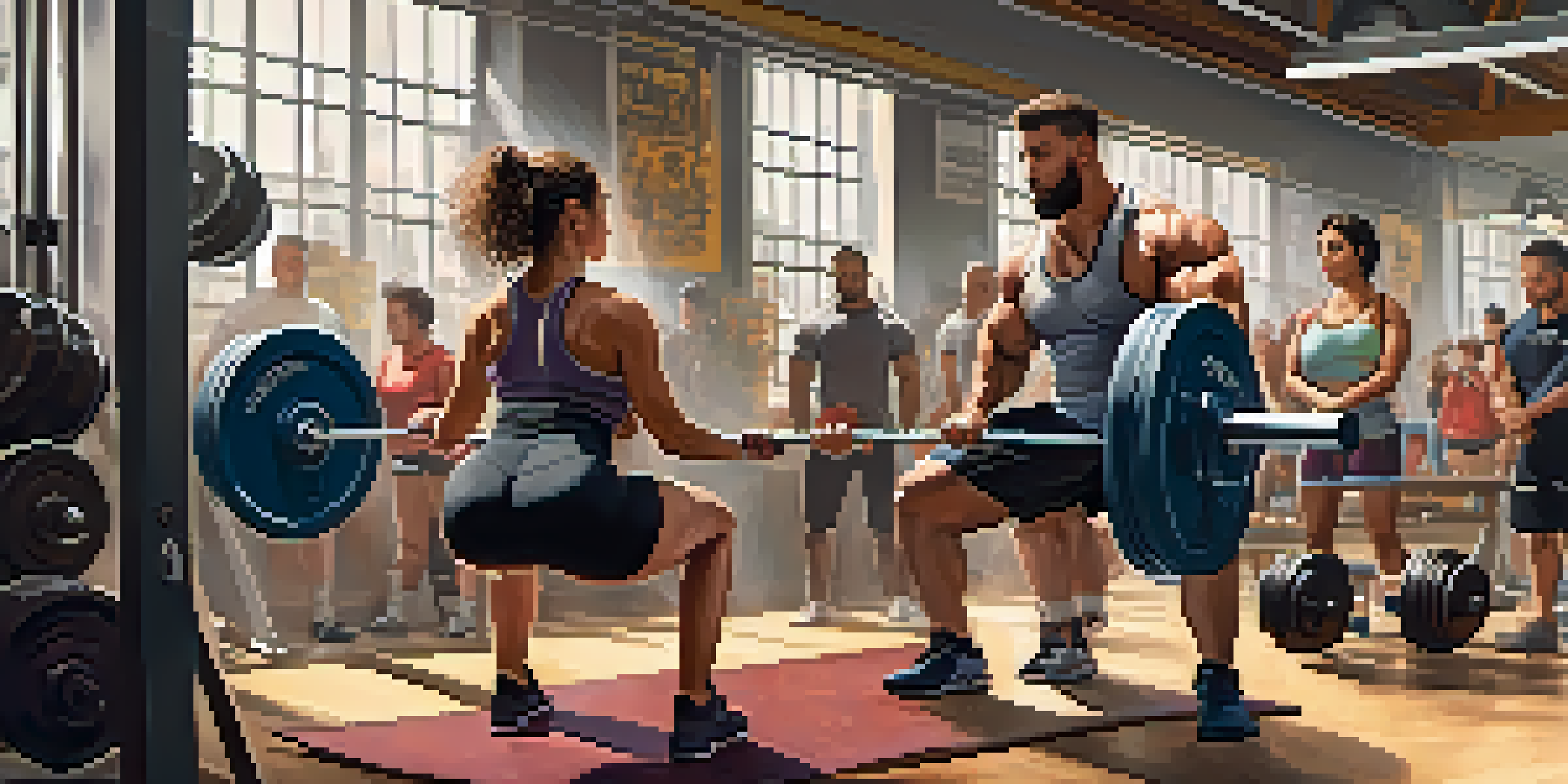Powerlifting and Disordered Eating: Signs to Watch For

Understanding Powerlifting and Its Demands
Powerlifting is a sport that emphasizes strength, focusing on three main lifts: the squat, bench press, and deadlift. Athletes often aim to lift the heaviest weights possible, pushing their bodies to the limit. This intense training can sometimes lead to an unhealthy relationship with food, as lifters may adopt extreme diets to meet weight class requirements or enhance performance.
Strength does not come from physical capacity. It comes from an indomitable will.
The competitive nature of powerlifting can create pressure to maintain a specific body weight, leading athletes to develop rigid eating patterns. As they strive for personal bests, they may prioritize performance over overall health, which can set the stage for disordered eating behaviors. Understanding these dynamics is crucial for both athletes and coaches to foster a healthier environment.
Recognizing the link between powerlifting and potential eating issues is essential for creating a supportive community. Acknowledging that the pursuit of strength should not come at the cost of mental or physical well-being is the first step toward prevention and intervention.
Common Signs of Disordered Eating in Lifters
Disordered eating can manifest in various ways, and it’s important for powerlifters and their coaches to be aware of these signs. Some common indicators include extreme calorie restriction, obsessive tracking of food intake, or avoiding certain food groups altogether. When an athlete becomes overly preoccupied with food, it may signal a deeper issue that needs attention.

Another concerning sign is the presence of guilt or anxiety surrounding food choices. If a lifter feels shame after eating specific foods or experiences anxiety about weight fluctuations, these feelings can lead to a vicious cycle of restriction and bingeing. This unhealthy mindset can significantly hinder performance and recovery.
Powerlifting's Impact on Eating Habits
The competitive nature of powerlifting can lead to disordered eating patterns as athletes prioritize weight class and performance over overall health.
Physical symptoms may also arise, such as unexplained weight loss, fatigue, or frequent injuries. Powerlifting requires a lot of energy and strength, and if an athlete isn't fueling their body properly, their performance will inevitably suffer. Observing these signs can serve as an early warning system for athletes and those around them.
The Role of Body Image in Powerlifting
Body image plays a significant role in how athletes perceive themselves and their performance. In powerlifting, where weight classes are crucial, athletes may develop an unhealthy fixation on their appearance and body composition. This fixation can lead to negative self-talk and a distorted view of what their bodies should look like, rather than focusing on their capabilities.
It’s not about being the best. It’s about being better than you were yesterday.
The impact of social media cannot be ignored, as lifters often compare themselves to idealized images of strength and fitness online. This constant comparison can exacerbate feelings of inadequacy and encourage harmful eating behaviors. It’s vital for athletes to cultivate a positive body image that prioritizes strength and performance over aesthetics.
Promoting a healthy body image within the powerlifting community involves celebrating all body types and recognizing that strength comes in various forms. Encouraging athletes to focus on their lifting goals rather than their appearance can help shift the narrative towards a more inclusive and supportive environment.
Mental Health and Its Link to Disordered Eating
Mental health plays a crucial role in the overall well-being of powerlifters, especially concerning disordered eating. Many athletes may struggle with anxiety, depression, or low self-esteem, which can contribute to unhealthy eating behaviors. Understanding this connection is vital for creating a supportive atmosphere that addresses both mental and physical health.
The pressure to perform at a high level can exacerbate mental health struggles, leading to a vicious cycle of stress and disordered eating. Athletes may turn to food as a coping mechanism, which can create feelings of guilt or shame that further impact their mental state. Recognizing these patterns is essential for intervention and support.
Recognizing Disordered Eating Signs
Common signs of disordered eating in lifters include extreme calorie restriction and anxiety surrounding food choices, which can hinder performance.
Encouraging open conversations about mental health within the powerlifting community can help destigmatize these issues. By fostering an environment where athletes feel comfortable discussing their challenges, we can promote healthier coping strategies and reduce the risk of disordered eating.
Intervention Strategies for Athletes
If you suspect that a powerlifter is struggling with disordered eating, it’s essential to approach the situation with care and empathy. One effective strategy is to encourage open dialogue about their eating habits and body image without judgment. This conversation can provide valuable insights into their mindset and may help them feel supported in seeking help.
Involving a registered dietitian who specializes in sports nutrition can also be beneficial. These professionals can offer tailored guidance on fueling the body for optimal performance while promoting a healthy relationship with food. Their expertise can help athletes understand how to meet their nutritional needs without compromising their well-being.
Additionally, fostering a culture of support within training groups can make a significant difference. Encouraging lifters to share their experiences and challenges can create a sense of community, helping individuals feel less isolated in their struggles. This camaraderie can be a powerful tool in promoting healthier habits.
Building a Supportive Training Environment
Creating a supportive training environment is essential for preventing disordered eating among powerlifters. Coaches and teammates play a critical role in shaping the culture of a training group, and fostering a positive atmosphere can significantly impact athletes' mental health. Encouraging open discussions about nutrition, body image, and mental well-being can help normalize these topics.
Promoting body positivity and inclusivity within the training environment can also make a difference. Celebrating each athlete's unique strengths, regardless of their body type, can help shift the focus away from appearance and toward performance. This shift in mindset is crucial for creating a healthier training space.
Fostering a Supportive Environment
Creating a positive training atmosphere and encouraging open discussions about nutrition and mental health can help prevent disordered eating among powerlifters.
Lastly, incorporating educational resources about nutrition and mental health into training programs can empower athletes to make informed choices. Workshops, seminars, or access to relevant literature can provide valuable information that enhances their understanding of these topics, leading to healthier practices both in and out of the gym.
Moving Forward: Prioritizing Health Over Performance
Ultimately, the goal of powerlifting should be to enhance overall health and performance, not to sacrifice one for the other. Athletes must recognize that their well-being is just as important as their lifting goals. By prioritizing health, they can achieve long-term success without the risk of developing disordered eating habits.
Encouraging athletes to listen to their bodies and understand their nutritional needs can lead to better performance outcomes. A balanced approach to eating, where they focus on nourishing their bodies, will promote recovery and strength gains over time. This mindset shift can help create a healthier relationship with food and exercise.

By fostering a culture that values health and well-being, the powerlifting community can help prevent disordered eating and support athletes in their journeys. Together, we can promote a more sustainable approach to strength training that honors both physical and mental health.